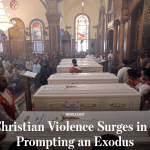The Trump administration is seeking to designate the Muslim Brotherhood as a foreign terrorist organization, the White House said, a move that could complicate relations with U.S. allies where Muslim Brotherhood affiliates currently serve in parliament and other government roles.
White House press secretary Sarah Sanders on Tuesday said that President Trump had “consulted with his national security team and leaders in the region who share his concern, and this designation is working its way through the internal process.”
The move comes weeks after Egyptian President Abdel Fattah Al Sisi met with Mr. Trump at the White House, where the two leaders discussed “the threat posed by the Muslim Brotherhood,” the White House said.
Under a designation as a foreign terrorist organization, companies and individuals could be banned from providing any type of material support or resources to Muslim Brotherhood officials, such as financial services, weapons or transportation.
It wasn’t immediately known whether the Trump administration’s designation would apply only to the Egyptian Muslim Brotherhood, or to the set of Islamist movements across the world that are informally referred to as the Muslim Brotherhood.
The designation would be the administration’s second such move in recent weeks. In early April, the administration designated Iran’s Islamic Revolutionary Guard Corps as a foreign terrorist organization, the first time an element of a foreign state had been officially named a terrorist entity.
The Muslim Brotherhood includes dozens of groups across the Middle East, each with varying ties to radicalism. It has also influenced other groups, including Hamas, which the U.S. has called a terrorist organization, leading critics to call the Brotherhood a gateway to jihadism.
Designating the Muslim Brotherhood as a terrorist group, which the Trump administration has been weighing for several years, would raise a complicated set of questions for the U.S. government, including how to navigate relations with countries where Brotherhood-affiliated groups have a role in politics and government.
U.S. allies where Islamists currently serve in the government include Tunisia, Morocco and Kuwait. Turkey’s ruling Justice and Development Party is also allied with the Muslim Brotherhood movement.
“What is significant about the Brotherhood everywhere is their stress on participation in electoral politics,” said Jon Alterman, a former policy planning staffer at the State Department, now with the Center for Strategic and International Studies in Washington. “And they do so in countries with very different records of allowing electoral politics to exist.”
Experts also questioned whether the Muslim Brotherhood meets the legal standards for groups that carry out politically motivated violence against noncombatants.
Jason Blazakis, who served from 2008 to 2018 as director of the Counterterrorism Finance and Designations Office in the State Department’s counterterrorism bureau, said the department examined a possible designation a number of times, including under then-Secretary of State Rex Tillerson in late 2017 and early 2018.
Mr. Blazakis, now director of the Center on Terrorism, Extremism, and Counterterrorism at the Middlebury Institute of International Studies, said that after a “pretty robust” review process, the administration concluded that it lacked the evidence to legally designate any component of the Egyptian Muslim Brotherhood.
The State Department on Jan. 31, 2018, designated two splinter groups from the Egyptian Muslim Brotherhood as specially designated global terrorists. The Egyptian Muslim Brotherhood didn’t meet the criteria for designation at that time, Mr. Blazakis said, and he is skeptical that it does today.
“It’s a group that obviously has had some rhetoric that’s problematic in the past.” he said. “It’s an organization that carried out deadly attacks, but that was a very long time ago.” You need recent activity that you can attribute to the group—ideally violent activity that you can attribute to the group—and that didn’t exist.”
In Egypt, the Muslim Brotherhood has a long and controversial role in politics dating to its founding in the country in 1928. The organization was banned for years after the government blamed it for a 1954 assassination attempt targeting President Gamal Abdel Nasser.
Following the 2011 Arab Spring revolution that ousted President Hosni Mubarak, the Brotherhood sought power in the country’s first free elections, and one of its members, Mohammed Morsi, won the presidency in 2012.
Mr. Morsi was deposed in a military coup in 2013 led by Mr. Sisi, a military chief who is now Egypt’s president. Following the military takeover, the state carried out the deadliest crackdown in Egypt’s modern history, targeting the Brotherhood and other political opponents. It killed more than a thousand people and detained tens of thousands of others.
“I don’t really know how Trump could do anything like this in the absence of any of the classification criteria,” said Amr Darrag, a former minister of planning in Mohammed Morsi’s government in Egypt who says he is no longer affiliated with the Brotherhood.
“The MB is in governments, some friendly to U.S., in parliament, in legitimate political parties, so how would he address all this?” said Mr. Darrag, who lives in exile in Turkey.
Egyptian government officials couldn’t be reached to comment on the Trump administration’s plans.
The Trump administration first raised the possibility of designating the Brotherhood as a terrorist group in the first weeks of Mr. Trump’s presidency in 2017. The idea fell by the wayside as the White House pressed ahead with another disruptive policy shift: the entry ban on citizens from seven Muslim majority nations.
___________________________
By Rebecca Ballhaus, Courtney McBride and Jared Malsin —Nancy A. Youssef contributed to this article.
https://www.wsj.com/articles/trump-administration-seeks-to-designate-muslim-brotherhood-as-terrorist-organization-11556631257?mod=searchresults&page=1&pos=2



